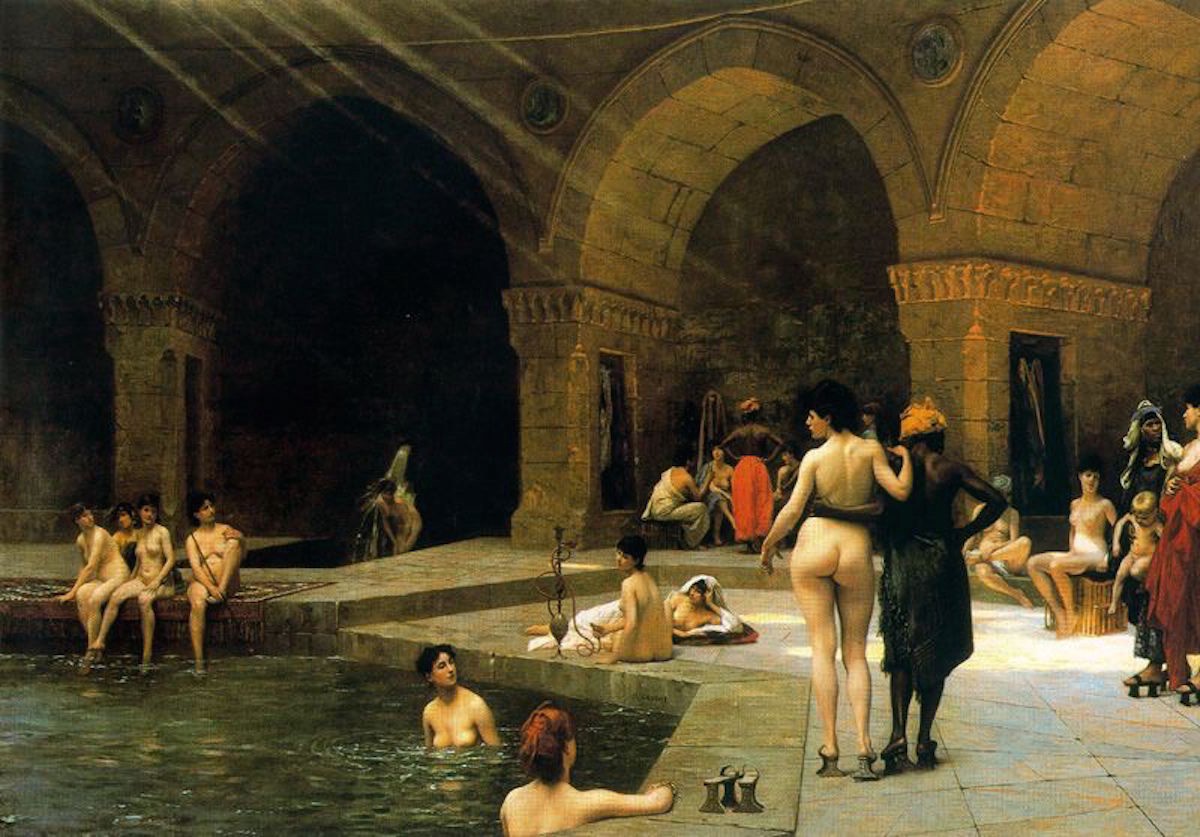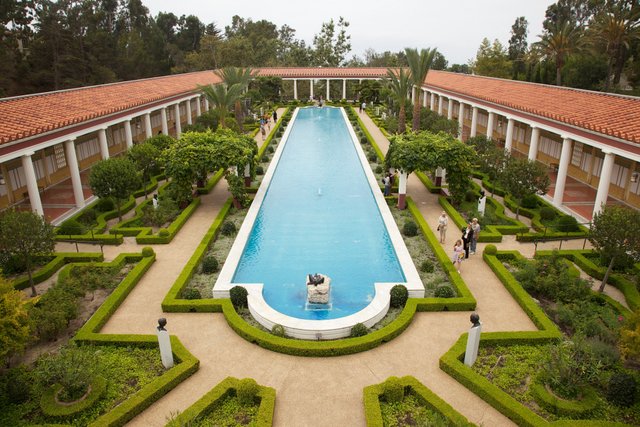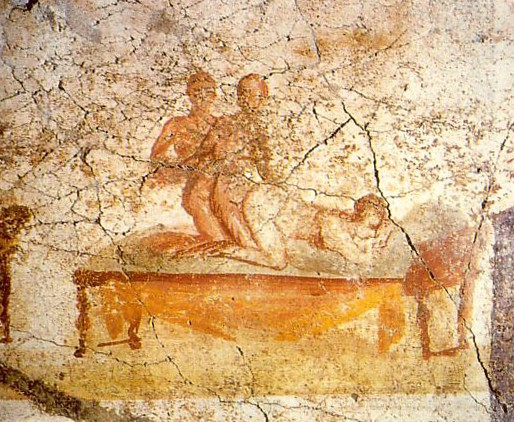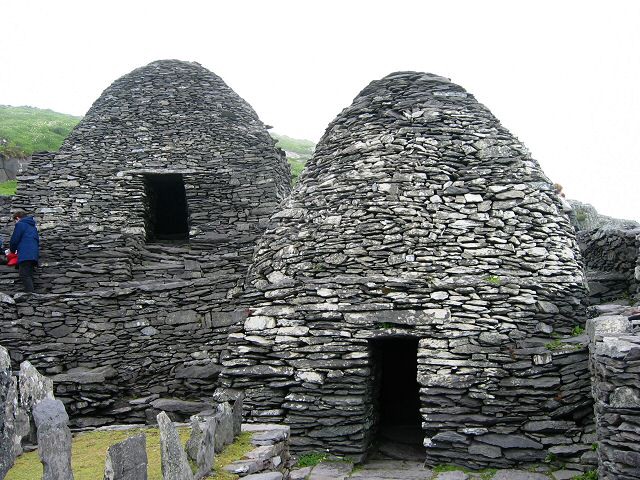The Birth And Death Of Privacy: 3,000 Years of History Told Through 46 Images

Section I:
How privacy was invented slowly over 3,000 years
“Privacy may actually be an anomaly” ~ Vinton Cerf, Co-creator of the military’s early Internet prototype and Google executive.
Cerf suffered a torrent of criticism in the media for suggesting that privacy is unnatural. Though he was simply opining on what he believed was an under-the-radar gathering at the Federal Trade Commission in 2013, historically speaking, Cerf is right.
Privacy, as it is conventionally understood, is only about 150 years old. Most humans living throughout history had little concept of privacy in their tiny communities. Sex, breastfeeding, and bathing were shamelessly performed in front of friends and family.
The lesson from 3,000 years of history is that privacy has almost always been a back-burner priority. Humans invariably choose money, prestige or convenience when it has conflicted with a desire for solitude.
This chapter takes a look at how technology shaped desires for privacy over the major epochs of human history.
Tribal Life (~200,000 B.C. to 6,000 B.C)

scolded the child and told it to cover its head with a mat”
~ UCLA Anthropologist, Jared Diamond
While extremely rare in tribal societies, privacy may, in fact, be instinctive. Evidence from tribal societies suggests that humans prefer to make love in solitude (In 9 of 12 societies where homes have separate bedrooms for parents, people prefer to have sex indoors. In those cultures without homes with separate rooms, sex is more often preferred outdoors).
However, in practice, the need for survival often eclipses the desire for privacy. For instance, among the modern North American Utku’s, a desire for solitude can seem profoundly rude:
“It dawned on me how forlorn I would be in the wildness if they forsook me. Far, far better to suffer loss of privacy” ~ Anthropologist Jean Briggs, on being ostracized by her host Utku family, after daring to explore the wilderness alone for a day.
The big question: if privacy isn’t the norm, where did it start? Let’s start from the first cities:
Ancient Cities (6th Century B.C. — 4th Century AD)

Like their tribal ancestors, the Greeks displayed some preference for privacy. And, unlike their primitive ancestors, the Greeks had the means to do something about it. University of Leicester’ Samantha Burke found that the Greeks used their sophisticated understanding of geometry to create housing with the mathematically minimum exposure to public view while maximizing available light.
Homepage
Get started
The Ferenstein Wire
Follow
Go to the profile of Greg Ferenstein
Greg Ferenstein
Writer. Researcher. Educator. Policy Wonk. Optimist.
Nov 24, 2015
The Birth And Death Of Privacy: 3,000 Years of History Told Through 46 Images
Jean-Leon Gerome, The Large Pool Of Bursa
2-Minute Summary
Privacy, as we understand it, is only about 150 years old.
Humans do have an instinctual desire for privacy. However, for 3,000 years, cultures have nearly always prioritized convenience and wealth over privacy.
Section II will show how cutting edge health technology will force people to choose between an early, costly death and a world without any semblance of privacy. Given historical trends, the most likely outcome is that we will forgo privacy and return to our traditional, transparent existence.
*This post is part of an online book about Silicon Valley’s Political endgame. See all available chapters here.
Section I:
How privacy was invented slowly over 3,000 years
“Privacy may actually be an anomaly” ~ Vinton Cerf, Co-creator of the military’s early Internet prototype and Google executive.
Cerf suffered a torrent of criticism in the media for suggesting that privacy is unnatural. Though he was simply opining on what he believed was an under-the-radar gathering at the Federal Trade Commission in 2013, historically speaking, Cerf is right.
Privacy, as it is conventionally understood, is only about 150 years old. Most humans living throughout history had little concept of privacy in their tiny communities. Sex, breastfeeding, and bathing were shamelessly performed in front of friends and family.
The lesson from 3,000 years of history is that privacy has almost always been a back-burner priority. Humans invariably choose money, prestige or convenience when it has conflicted with a desire for solitude.
This chapter takes a look at how technology shaped desires for privacy over the major epochs of human history.
Tribal Life (~200,000 B.C. to 6,000 B.C)
Flickr user Rod Waddington
“Because hunter-gatherer children sleep with their parents, either in the same bed or in the same hut, there is no privacy. Children see their parents having sex. In the Trobriand Islands, Malinowski was told that parents took no special precautions to prevent their children from watching them having sex: they just scolded the child and told it to cover its head with a mat”
~ UCLA Anthropologist, Jared Diamond
While extremely rare in tribal societies, privacy may, in fact, be instinctive. Evidence from tribal societies suggests that humans prefer to make love in solitude (In 9 of 12 societies where homes have separate bedrooms for parents, people prefer to have sex indoors. In those cultures without homes with separate rooms, sex is more often preferred outdoors).
However, in practice, the need for survival often eclipses the desire for privacy. For instance, among the modern North American Utku’s, a desire for solitude can seem profoundly rude:
Inuit family. Source: Wikipedia Ansgar Walk
“It dawned on me how forlorn I would be in the wildness if they forsook me. Far, far better to suffer loss of privacy” ~ Anthropologist Jean Briggs, on being ostracized by her host Utku family, after daring to explore the wilderness alone for a day.
The big question: if privacy isn’t the norm, where did it start? Let’s start from the first cities:
Ancient Cities (6th Century B.C. — 4th Century AD)
Image: Roman citizens engaged in conversation in a public restroom. Credit: A Day In The Life Of Ancient Rome
Like their tribal ancestors, the Greeks displayed some preference for privacy. And, unlike their primitive ancestors, the Greeks had the means to do something about it. University of Leicester’ Samantha Burke found that the Greeks used their sophisticated understanding of geometry to create housing with the mathematically minimum exposure to public view while maximizing available light.
Sightline analysis of maximum viewable space from the street. Burke (2000)
However, Athenians penchant for solitude was not without its influential critics:
“For where men conceal their ways from one another in darkness rather than light, there no man will ever rightly gain either his due honour or office or the justice that is befitting” ~ Socrates
Athenian philosophy proved far more popular than their architecture. In Greece’s far less egalitarian successor, Rome, the landed gentry built their homes with wide open gardens. Turning one’s house into a public museum was an ostentatious display of wealth. Though, the rich seemed self-aware of their unfortunate trade-off:
Great fortune has this characteristic, that it allows nothing to be concealed, nothing hidden; it opens up the homes of princes, and not only that but their bedrooms and intimate retreats, and it opens up and exposes to talk all the arcane secrets” ~ Pliny the Elder, ‘The Natural History’, circa 77 A.D.
The majority of Romans lived in crowded apartments, with walls thin enough to hear every noise. “Think of Ancient Rome as a giant campground,” writes Angela Alberto in A Day in the life of Ancient Rome.

Baths, drink and sex corrupt our bodies, but baths, drink and sex make life worth living” ~ graffiti — Roman bath
Early Middle Ages (4th century AD-1,200 AD): Privacy As Isolation
“Just as fish die if they stay too long out of water, so the monks who loiter outside their cells or pass their time with men of the world lose the intensity of inner peace. So like a fish going towards the sea, we must hurry to reach our cell, for fear that if we delay outside we will lost our interior watchfulness”
~ St Antony of Egypt
It is rumored that on the island monastery of Nitria, a monk died and was found 4 days later. Monks meditated in isolation in stone cubicles, known as “Beehive” huts.
Upvoted on behalf of @thehumanbot and it's allies. Write less but write great original content, which is the key to success in Steemit. If you are using any image or video, cite proper source. Even if its your own image or video, it's worth mention the same. Also be careful to avoid duplicate posting.
Great Original Works are rewarded by top Curators, refer posts from my Step-Brother @humanbot for more details.If you like this initiative, you can follow me in SteemAuto and upvote the posts, that I upvote.
And remember to do some charity when you are rich by contributing to me. Check out my Introduction Post for more details. If you have any concerns or feedback with my way of operation, raise it with @sanmi , my operator who is freaking in Steemit chat most of the time.